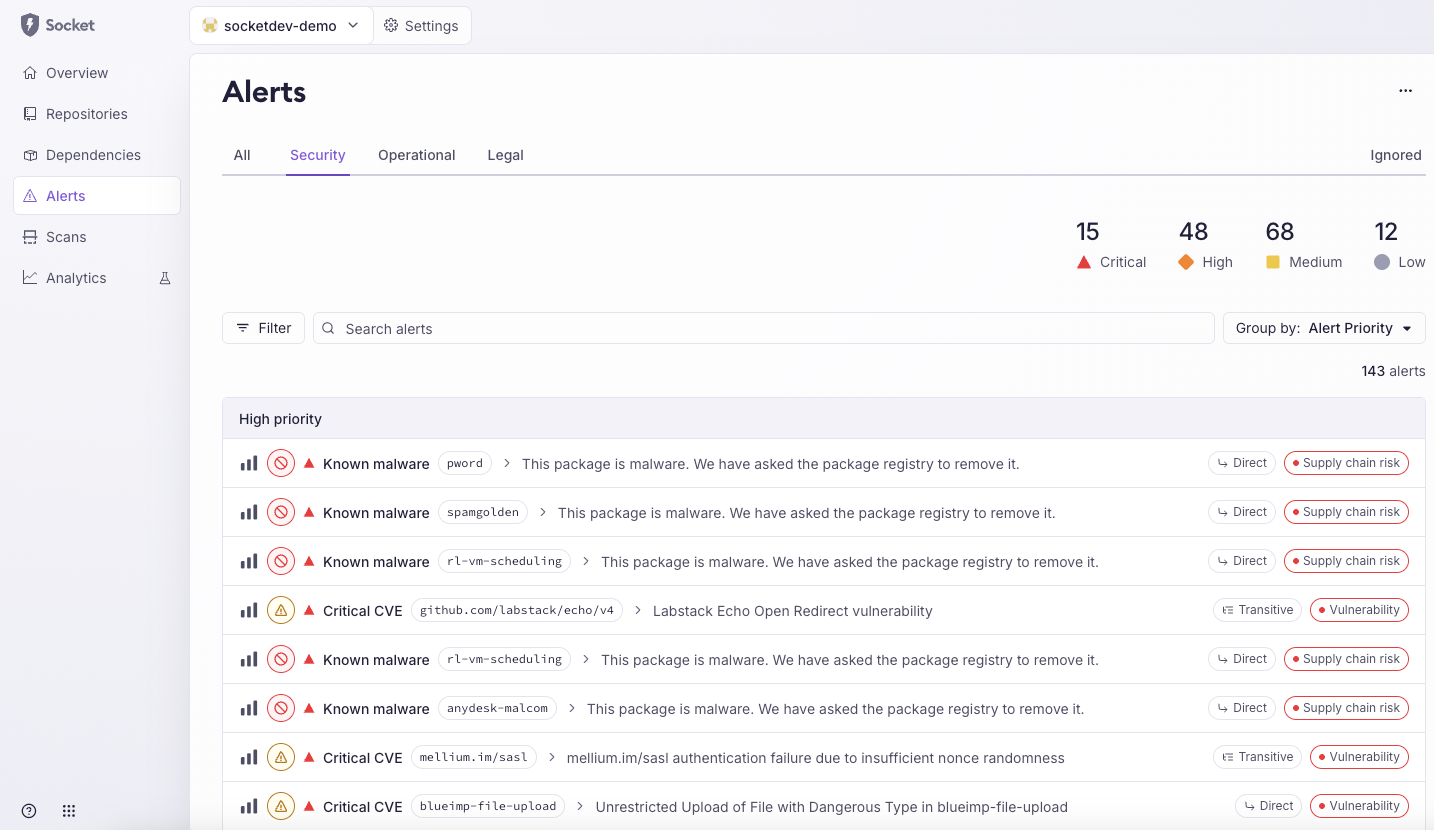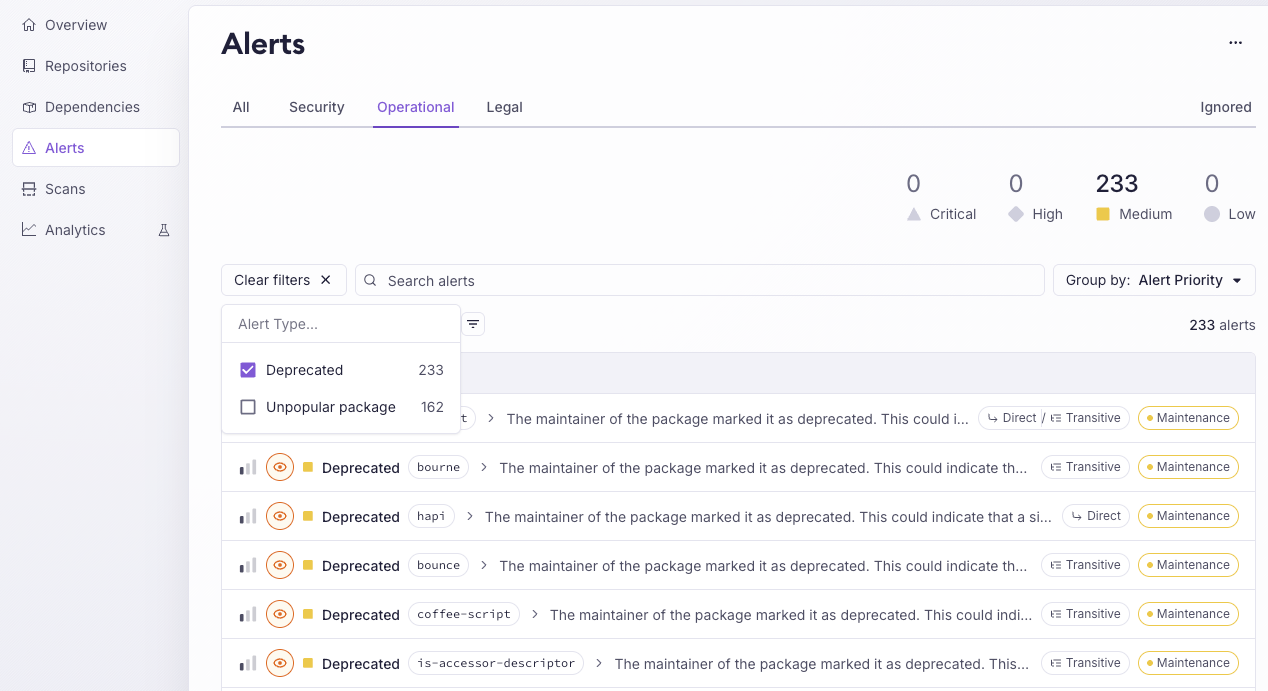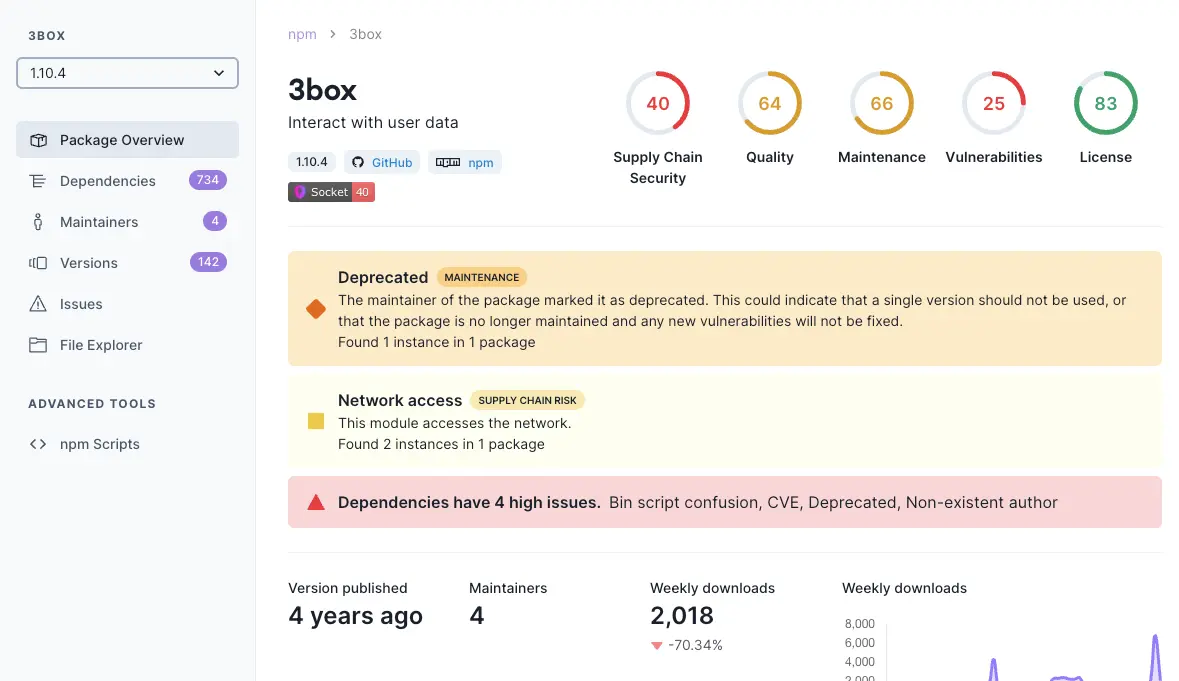Deprecated
Severity
Medium
Short Description
The maintainer of the package marked it as deprecated. This could indicate that a single version should not be used, or that the package is no longer maintained and any new vulnerabilities will not be fixed.
Suggestion
Research the state of the package and determine if there are non-deprecated versions that can be used, or if it should be replaced with a new, supported solution.
Information
Deprecated dependencies, especially when they have been silently deprecated, can introduce a multitude of risks to your code base:
- Security vulnerabilities due to not receiving any security updates or patches
- Lack of active support
- Reduced performance
- Compatibility issues with other packages
- Increased maintenance burden
- Compliance and reputation risks
Socket automatically runs checks with every GitHub PR for packages that have been designated as Deprecated and these results will also appear in the dashboard’s Alerts table. Developers can sort by alert type and see if the deprecated packages are direct or transitive dependencies.

These alerts also appear on Socket's package pages, in case you want to manually search a package or delve deeper, with more information than the official npm package registry provides.
Knowing if a package is deprecated will help you avoid building your apps and projects on this risky code. Since the Node ecosystem changes rapidly, Socket will alert you whenever a package you're using becomes deprecated, so you can take appropriate actions.
Recommended actions
Update to a Supported Version:
- Check for Updates: Look for a newer, supported version of the deprecated package. Sometimes, maintainers provide an updated version that addresses the reasons for deprecation.
- Follow Upgrade Guides: Review the package's documentation or release notes for guidance on migrating to the new version. There might be breaking changes that need to be addressed in your code.
Find an Alternative Package:
- Search for Alternatives: Identify other packages that offer similar functionality and are actively maintained. Scrolling down on the Socket package page, you will find AI-powered suggestions for alternative packages with similar capabilities:

- Evaluate Stability and Popularity: Choose an alternative that is stable, widely adopted, and regularly updated. Check the number of downloads, stars, and recent activity on its repository.
Fork and Maintain the Package:
- Fork the Repository: If you rely heavily on the deprecated package and no suitable alternatives exist, consider forking the repository to maintain it yourself.
- Community Collaboration: Collaborate with other developers facing the same issue. Joint efforts can help share the maintenance burden.
Minimize Dependencies:
- Reduce Dependency Usage: Evaluate if the dependency is essential. Sometimes, it’s possible to remove or reduce the use of external packages by writing custom code. This may also reduce your overall attack surface.
- Consolidate Packages: Replace multiple deprecated or under-maintained packages with fewer, more reliable ones.
Examples
Here's an example of a package with the Deprecated alert.

It's important to note that a package may also be deprecated and not show this alert if the maintainer has not officially designated a package or a version of a package as deprecated. Some package authors simply add big bright text to the README file to indicate that it's deprecated.
Magecart Attacks: The Magecart Attacks are one famous example of hackers exploiting outdated dependencies. Magecart is a collective of hacking groups known for injecting malicious JavaScript into websites to steal payment card information. Many of these attacks exploited vulnerabilities in outdated or deprecated JavaScript libraries and plugins used by the targeted websites.
Detection Method
npm: This alert is for packages that have been officially deprecated through npm's process of deprecating a package or a specific version.
pyPI: For PyPI, it detects packages that have officially been yanked where developers have marked a package as deprecated by specifying the yanked attribute in the release metadata. This indicates that the release should not be used, but it doesn't delete it from the index. This approach helps inform users that they should avoid using a particular version of a package while maintaining historical records.
Additional resources
- How to Protect Your Projects from the Risks of Deprecated npm Packages
- Researchers at Aqua Nautilus found that 8.2% percent of the most downloaded npm packages are officially deprecated, but due to inconsistent practices in handling package dependencies, the real number is much larger, closer to 21.2%.